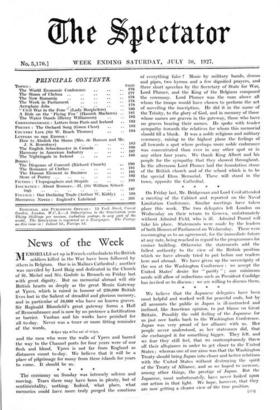The ceremony on Sunday was intensely solemn and moving. Tears
there may have been in plenty, but of sentimentality, -nothing. Indeed; what place, what memories could have more truly purged the emotions of everything false ? Music by military bands, drums and pipes, two hymns and a few dignified prayers, and three short speeches by the Secretary of State for War, Lord Plumer, and the King of the Belgians composed the ceremony. Lord Plumer was the man above all whom the troops would have chosen to perform the act of unveiling the inscription. He did it in the name of the Trinity, to the glory of God, and in memory of those whose names are graven in the gateway, those who have no graves bearing their names. He spoke with tender sympathy towards the relatives for whom this memorial should fill a blank. It was a noble religious and military ceremony, raising to the highest plane the feelings of all towards a spot where perhaps more noble endurance was concentrated than ever in any other spot or in any other four years. We thank King Albert and his people for the sympathy that they showed throughout. In the afternoon Lord Plumer laid the foundation stone of the British church and of the school which is to be the special Eton Memorial. These will stand in the town, opposite the Cathedral.


































